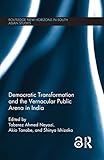Democratic transformation and the vernacular public arena in India
Material type: TextSeries: Routledge new horizons in South Asian studiesPublication details: London Routledge 2014Description: xv,221p. 24 cmISBN:
TextSeries: Routledge new horizons in South Asian studiesPublication details: London Routledge 2014Description: xv,221p. 24 cmISBN: - 9780415738675
- 306.20954 22 DE-
- JQ281 .D54 2014
- SOC008000
 Print
List(s) this item appears in:
Global Library Recent Acquisitions March 2015(Part-2)(List)
Print
List(s) this item appears in:
Global Library Recent Acquisitions March 2015(Part-2)(List)
| Item type | Home library | Collection | Shelving location | Call number | Materials specified | Status | Date due | Barcode | |
|---|---|---|---|---|---|---|---|---|---|
 Print
Print
|
OPJGU Sonepat- Campus | General Books | Main Library | 306.20954 DE- (Browse shelf(Opens below)) | Available | 130537 |
Includes bibliographical references and index.
"Since the structural change in Indian society that began in the 1990s - the result of the liberalization of the economy, devolution of power, and decentralization of the government - an unprecedented, democratic transformation has been taking place. This has caused the emergence of unexpected coalitions and alliances across diverse castes, classes, and religious groups according to the issues involved. In this volume, we intend to understand this deepening of democracy by employing a new analytical framework of the "vernacular public arena" where negotiations, dialogues, debates and contestations occur among "vernacular publics." This reflects the profound changes in Indian democracy as diverse social groups, including dalits, adivasis and Other Backward Classes; minorities, women; individuals from rural areas, towns, and cities; the poor and the new middle classes - the "vernacular publics" - participate in new ways in India's public life. This participation is not confined to electoral politics, but has extended to the public arenas in which these groups have begun to raise their voice publicly and to negotiate and engage in dialogue with each other and the wider world. Contributors demonstrate that the participation of vernacular publics has resulted in the broadening of Indian democracy itself which focuses on the ways of governance, improving people's lives, life chances, and living environments. An original, comprehensive study that furthers our understanding of the unfolding political dynamism and the complex reshuffling and reassembling taking place in Indian society and politics, this book will be relevant to academics with an interest in South Asian Studies from a variety of disciplines, including Political Science, Sociology, Anthropology and Media Studies"--
There are no comments on this title.

